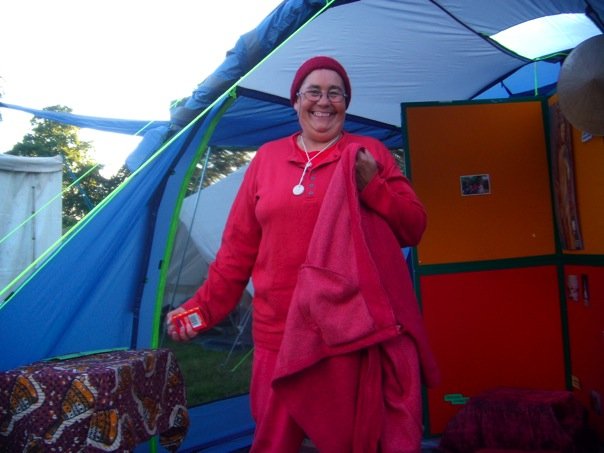Modgala, a Buddhist nun working with the Amida Trust, speaks to Kat Hobbs of CAAT about taking action at the DSEI arms fair in 2001 and what action she will take at DSEI 2011.
Why take action?

“I’m in favour of direct action, as long as it doesn’t distress people. I don’t have any qualms about disabling the equipment – just when and where.”
While giving teachings in former Yugoslavia in 2003, Modgala experienced first hand the destruction that conflict brings. Prior to going to her first demonstration on 11 September 2001 she came across a photograph at a John Pilger exhibition: “a photo of an empty bed, where you could see the bloodstains underneath. It opened my eyes. I realised I had to do something.”
She decided to take direct action against the “war mongers and money makers” who benefit from conflict, death, and destruction. DSEI seemed like the perfect opportunity to peacefully confront them, although she stresses “when I say it has to be peaceful, I mean it has to be strong as well. If we can have a really big and peaceful coming together at DSEI- that’s really powerful.”
After attending a training session with Turning the Tide she chose to take part in Non Violent Direct Action (NVDA) because “we need to be visible to ordinary people, and to come together. It’s about standing up for peace and reconciliation, and not war and devastation.” The training was “incredibly useful and thought provoking – I learnt more about what it would feel like to take action.”
DSEI 2001
In September 2001, Modgala joined the vibrant crowds who placed their bodies and their voices in the way of the arms fair’s destructive business. Modgala describes the experience as “surreal. Utterly incredible and shocking.”
As the events of September 11 unfolded, the arms fair at the ExCel centre continued with business as usual. There was shock and confusion among the gathered crowds as news of attacks filtered in. Images began appearing of the Twin Towers on shop-window televisions and in cafés and pubs. Meanwhile, at the ExCel centre, “the arms dealers were still driving up. That disgusted me more than anything.”
Modgala and other Buddhists attempted to engage with dealers as they came and went, praying, meditating, and ringing prayer bells. Watching the cars carrying dealers inside, Modgala “bowed to the cars, and made a plea in my heart”. As she watched, she vividly recalled one woman in Sarajevo, and watching her fall to her knees as she spoke about the impact of the war on her life. Inside, the arms fair continued without a flicker.
On the streets, Modgala was struck by the protesters “community spirit” and inspired by “the people I met with, and how deeply caring people actually are.” Many people present were locals, especially older people, who were “full of grief at war happening again”, and shock that its merchants had chosen the East London Docklands (almost totally destroyed during bombing raids in World War Two) to stage the world’s largest arms fair.
Having grown up in London with vivid memories of the old bomb sites and experience of life in conflict zones, Modgala admits: “I have more angry feelings towards the makers of missiles, the makers of weapons [than the armed forces].” It is the self-interest and greed of the few which harms others for private gain.
DSEI 2011
With DSEI set to open and be “bigger than ever” on 12 September 2011, Modgala believes that the need to oppose it is stronger than ever. It will take a diversity of non-violent tactics, many people “demonstrating powerfully, but in a different way”, to stop the arms fair. The hardest thing about being involved in DSEI protests is “living with the despair that it goes on, but still continuing to speak out.”
With arms sales and the repression of the Arab Spring in the news, it is a timely reminder to “look, and see what you can do from where you are. And to do something – whether it be write a letter, or to come to DSEI and stand together with others. Remember how a ripple can spread. And when my children’s children ask me – what did you do? At least I can say I tried to do something. It’s for future generations that the work we do now may bear fruit.”
Modgala is a nun with the Amida Buddhist Centre, and one of thousands who have come together to oppose the DSEI arms fair. Working with the Amida Trust, the Network of Engaged Buddhists, Buddhists for Peace, and other Buddhists, she has prayed, meditated and engaged in direct actions since her first visit to DSEI in 2001. She has recently published a book, You might as well die here as anywhere, about her experiences as a health worker in Zambia.

